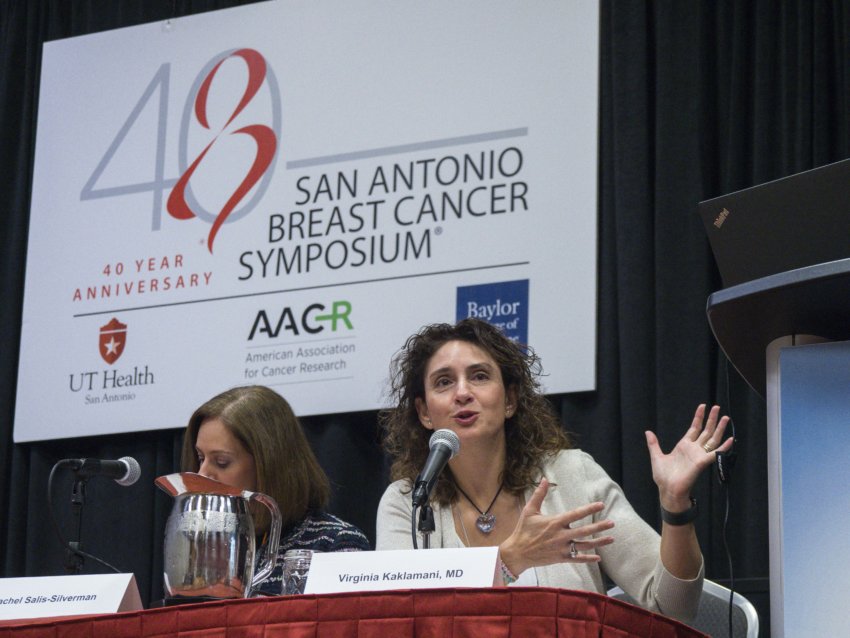Elacestrant may improve care of metastatic ER+/HER2- tumors
Contact: Will Sansom, 210-567-2579, sansom@uthscsa.edu
SAN ANTONIO (Nov. 30, 2022) — Phase III results of EMERALD, a clinical trial evaluating a novel oral drug therapy for metastatic ER-positive/HER2-negative (ER+/HER2-) breast cancer, will be presented Thursday, Dec. 8, at the San Antonio Breast Cancer Symposium (SABCS). Virginia Kaklamani, MD, professor of medicine with the Mays Cancer Center at The University of Texas Health Science Center at San Antonio (UT Health San Antonio), will outline the results on behalf of a global team of EMERALD collaborators.
The 2022 SABCS is Dec. 6-10 at the Henry B. Gonzalez Convention Center in downtown San Antonio. This scientific and educational event, initiated and owned by the Mays Cancer Center at UT Health San Antonio, is the world’s largest breast cancer symposium with more than 9,500 clinicians, bench researchers and patient advocates from 90 countries convening in San Antonio for five days each December. The Mays Cancer Center, a National Cancer Institute-Designated Cancer Center, launched the SABCS in 1977 as a one-day regional conference, and over the four decades it has grown to international stature.
Kaklamani, leader of the Breast Cancer Program at the Mays Cancer Center and professor of medicine at UT Health San Antonio, is SABCS co-director with Carlos Arteaga, MD, director of the Harold C. Simmons Comprehensive Cancer Center at The University of Texas Southwestern Medical Center, Dallas.
Patients with ER+/HER2- breast cancers have poor survival if their tumors advance despite standard-of-care therapy, Kaklamani said. Elacestrant, the novel oral drug therapy under evaluation in EMERALD, is among a class of anticancer drugs called selective estrogen receptor degraders (SERDs). The clinical trial is comparing outcomes attained with standard-of-care endocrine therapy versus those attained with elacestrant drug therapy. The trial has shown to date that elacestrant improves outcomes in patients compared with standard-of-care endocrine therapy. Elacestrant is currently being evaluated by the U.S. Food and Drug Administration for approval.
The EMERALD trial has included six patients at the Mays Cancer Center, Kaklamani said.
Other SABCS presenters from UT Health San Antonio include Reuben Harris, PhD, professor and chairman of biochemistry and structural biology, who will discuss “APOBEC and genome evolution in metastatic breast cancer” in a basic science workshop on Tuesday, Dec. 6. APOBEC, a group of enzymes, is one of the most common sources of mutation in cancer, appearing in more than half of human tumors.
Ratna K. Vadlamudi, PhD, professor of obstetrics and gynecology in the Joe R. and Teresa Lozano Long School of Medicine at UT Health San Antonio and co-leader of the Cancer Development and Progression Program at the Mays Cancer Center, will chair a poster discussion session Wednesday, Dec. 7, on advances in triple-negative breast cancer biology. This type of breast cancer is one of the most difficult to treat.
Kate Lathrop, MD, associate professor of medicine and breast disease specialist at the Mays Cancer Center, and Kaklamani are among authors of a poster titled “Genomic and transcriptomic landscape of HER2-low breast cancer.”
Also Dec. 7, Andrew Brenner, MD, professor of medicine and cell systems and anatomy in the Long School of Medicine and investigator with the Mays Cancer Center, will chair a poster discussion session on brain metastasis. Brenner is a specialist in both breast cancer and malignancies of the brain and spinal cord.
On Saturday, Dec. 10, SABCS Co-Directors Kaklamani and Arteaga will culminate the annual symposium as they moderate a year in review discussion.
The American Association for Cancer Research (AACR) and Baylor College of Medicine are SABCS collaborators with the Mays Cancer Center.
The University of Texas Health Science Center at San Antonio (UT Health San Antonio), a primary driver of San Antonio’s $42.4 billion health care and biosciences sector, is the largest research university in South Texas with an annual research portfolio of $360 million (FY22), on track for $400 million (FY23). Driving substantial economic impact with its five professional schools, a diverse workforce of more than 7,000, an annual operating budget of more than $1 billion and a clinical practice that provides more than 2 million patient visits each year, UT Health San Antonio plans to add more than 1,500 higher-wage jobs over the next five years to serve San Antonio, Bexar County and South Texas. To learn about the many ways “We make lives better®,” visit www.uthscsa.edu.
The Mays Cancer Center at UT Health San Antonio is one of only four National Cancer Institute-designated Cancer Centers in Texas. The Mays Cancer Center provides leading-edge cancer care, propels innovative cancer research and educates the next generation of leaders to end cancer in South Texas. Visit www.cancer.uthscsa.edu.
Stay connected with The University of Texas Health Science Center at San Antonio on Facebook, Twitter, LinkedIn, Instagram and YouTube.


